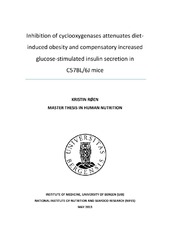| dc.description.abstract | Obesity is considered a state of low-grade inflammation, and this inflammation is strongly related to development of systematic insulin resistance. Hyperglycemia develops during insulin resistance as insulin-stimulated glucose uptake in peripheral insulin sensitive tissues is reduced. Hepatic insulin resistance is often accompanied with increased gluconeogenesis and increased hepatic glucose output, which further increase blood glucose. To cope with the hyperglycemia, the pancreatic -cells compensate by increasing insulin secretion. However, after a certain amount of time, the -cells are no longer able to compensate, and insulin production stops. This may be accompanied with apoptosis in the -cells. Indomethacin is an NSAID and a non-selective inhibitor of cyclooxygenase 1 (COX-1) and 2 (COX-2). In this study we have demonstrated that COX-inhibition using indomethacin, attenuated high fat/high sucrose-induced obesity in C57BL/6J mice. Obesity and glucose intolerance normally co-occur, and it has been generally assumed that glucose intolerance and subsequently increased insulin secretion and insulin resistance are consequences of increased adipose tissue mass. Paradoxically, the mice were lean, but indomethacin did not prevent the reduced glucose intolerance associated with an high fat/high sucrose diet. This study confirmed that indomethacin was able to attenuate diet-induced obesity. However, we here demonstrated that indomethacin was not able to reverse obesity. An unpublished study from our group has shown that insulin levels in both fed and fasted state in indomethacin supplemented high-fat/high-sucrose (HF/HS) fed mice were significantly lower than in HF/HS-fed mice. In this study we found that indomethacin attenuated the increased glucose-stimulated insulin secretion (GSIS) caused by the HF/HS-diet. Indomethacin was, however, unable to reduce the increased GSIS in obese mice. Of note, we were only able to measure an effect of indomethacin when glucose was injected intraperitoneal. We could not observe a lower GSIS in HF/HS- fed mice supplemented with indomethacin when glucose was administered orally. Neither, indomethacin did not inhibit insulin secretion induced by a meal or had an acute effect on GSIS. Thus, indomethacin is able to attenuate, but not reverse HF/HS-induced GSIS. | en_US |
